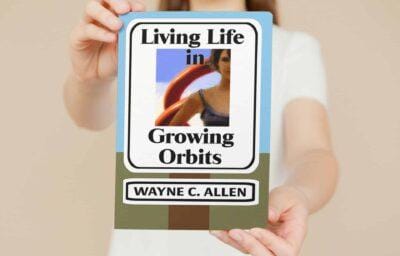- Bring Wisdom — 12 Ideas
- About Anxiety — 12 Ideas
- About Taking Action — 12 Ideas
- About Self Actualizing — 12 Ideas
- About Results — 12 Ideas
- About Mind Movies — 12 Ideas
- About Knowing Yourself — 12 Ideas
- About Being Chained – 12 Ideas Series
- About I‑am-ness — 12 Ideas
- About Happiness – 12 Ideas
- About No Past – 12 Ideas
- About Embodiment — 12 Ideas
About Happiness — The key to happiness and contentment: happiness is determined by your intention.

Living Life in Growing Orbits is our workbook.
52 weeks of daily exercises designed to help you figure yourself out.
Check out Living Life in Growing Orbits on our site.
Direct link to Amazon
Purchase digital versions (Apple, Nook, Kobo, etc.) from this page
The key to happiness and contentment is
determined by your intention.
This was one of those “Of course!” moments for me. I realized that one could analyze the first two (happiness and contentment) only on the basis of the last one (intention). But it’s a bit complicated, so let’s unpack.
You have to listen to me…

I ask a father, “What is your intention for your kids?”
He replies, “I want them to be happy.”
I ask, “What does happiness look like?”
He: “They listen to me and do what they are told.”
Me: “How do you get them to listen and to obey?”
He: “I yell at them, until they do what I want them to.”
Me: “Are they happy, and are they doing what you want?”
He: “No, so I yell louder.”
Me: “Are you happy / content?”
He: “No. but a father has to sacrifice for his kids.”
And on and on.
Most people have not unpacked their intentions, and have no clue what happiness / contentment looks like for them.
They are sure, however, that it involves someone or something outside of themselves doing things differently.
By the bye, the wife of the above guy told me she wouldn’t be happy until he stopped yelling at the kids, and besides, she wasn’t sure why she married him in the first place. But had to stay, “For the kids.”
I did this same dance with my therapist back in 1996, when she asked me if I was happy, and I replied with a list of things I needed first. She said, “OK, you have those things. Are you happy?”
I came up with another list.
Moral of the story? I was fixated on the things I needed to eventually by happy / content, and the list always led to… you guessed it… more lists.
I had to learn what I call the “lesson of presence.” When I brought my attention from lists and future happiness, I became aware that I was doing well, right now.
I’ve come to the conclusion that what’s really necessary is a relentless, 100% commitment to being present.
And a chief aspect of presence is knowing, with crystal clarity, what games I am playing with myself.

In the dad’s case, above, I’m sure he was used to most people letting up on him after he said he wanted his kids to be happy, to listen, and to be well behaved.
Most people hear platitudes like that and drop the enquiry.
Indeed, most people drop the enquiry as they bump up against their own, flawed platitudes.
One client decided not to be depressed any more. I replied that she’d have to endlessly pay attention to her moods. This wasn’t pleasing to her, as she thought that simply deciding not to be depressed should fix everything.
Paying attention to how she depressed herself wasn’t interesting to her. Because of this, her actual intention was to pretend she was “cured” while ignoring herself, her way of being, and her moods.
In each case, there is the story we tell ourselves (and others) and what lies beneath it—the real story.
In the dad’s case, the hidden story was, “Dads keep their kids in line by yelling at them—otherwise, they are out of control.”
Most people don’t examine this hidden story or motivation, and since they hide it from themselves, they can’t understand why their platitudes (“I want my kids to be happy”) never come true.
A 100% commitment to self discovery requires that we challenge our platitudes, to see what props them up.
People tell me the latest disaster story, and totally miss that the story is just the latest in a long string of the same story.
Many people I know, for example, are “fixers.” They assure me that they will be content when the present “fix” takes hold.
However, they miss that “fixers,” by definition, need someone or something to fix.
So, even if the fix takes, if they continue to be a “fixer,” they have to create something new to fix, or break something they already fixed. Just to have something to do.
And since happiness and contentment, for them, hinges on the platitude of having everything fixed, (while umconsciously continuing to break stuff,) they never get to “there.”
Our approach to all of this is relentless self-examination and here-and-now living.
The key is contained in the words self, and here-and-now.
Either alone or with a therapist, you must get a handle on your stories, dreams, wants, and evasions. In other words, all of those external things you blame for how you are need to be let go of, and then set aside.
For example, with the dad, above, the work was at the level of the final belief: in his case, “My job is to yell at the kids until they obey.”
You narrow it down: “I must fix everyone.” “All men leave me.” “I need everyone to love me and think I’m wonderful.” Whatever.
Once you get to the bottom of the stories, you’ll see that you have a belief about how others (things or people) ought to be, and will see that you are repeating this theme over and over, and never getting anywhere with it.
Once you see what you are doing, you can take responsibility for it, and then ask, “What can I do, right now, to bring peace, contentment, and happiness to my life?”
If your answer has anything to do with something outside of yourself and in some time-frame other than now, go back to the drawing board.
In the end, it’s all about discovering your own level of commitment to your walk–your path–and your level of happiness and contentment. This begins by understanding that happiness and contentment are self-determined, 100% of the time.
It’s your walk, your path, and if you are bogged down, you walked into the bog.
Ultimately, it is possible to get to the point of Simple Presence, that state of grace where you just are. No goals, no things, and others to fix, just being in the moment and appreciating the moment for what it is. Nothing to do, nothing to eventually become.
This is living at its finest.





